I’m planning out a photobash (hopefully part of a set) showcasing options and possibilities for a more solarpunk world. My goal for these is for them to be a more practical and actionable view of a solarpunk society, more than just green skyscrapers or super scifi-looking places. I’m mostly setting these in a post-crumbles setting, with a focus on rebuilding in a more thoughtful and inclusive way. I want to try to illustrate solarpunk concepts and themes directly.
I’ve done a co-op salvaging technology for reuse, and a high speed railway, and I’d like to take a shot at showing the places where people live next - just a street at a time, so not every scene will check every box, but I’d very much like to source ideas to include while I’m still planning layouts.
I’ve got a few different elements I’d like to include already (again maybe not all in one scene):
- More colorful buildings, emphasizing buildings as a canvas for art from graffiti to commissioned murals
- Lots and lots of trees. I like the idea of a street/path layout that provides each building with some kind of vehicle access (for firetrucks and ambulances and handicapped people, along with day-to-day things like moving trucks, large items deliveries, construction vehicles) while converting many roads to forested bike and pedestrian paths. At the very least, more tree-lined streets
- Streetcars/streetcar cables overhead (emphasizing public transit)
- options for a Third Place, where people can be outside home or work without having to be customers or tresspassers (I really don’t have any of these yet)
- Alternate uses of existing structures and resources; I want to avoid the feeling of a scratch-built or utopian future. I’m currently working on a parking garage converted to living space with colorful facades between the concrete, and a farm, park, or forest (I haven’t decided yet) on the roof
- The tech salvage co-op from last time delivering a laptop or running wires, building a meshnet
- Green energy, solar and wind in realistic locations (so not much wind in the cityscapes, I suspect) especially in a setting where infrastructure has been neglected and rebuilt
- Alternatives to corporations, and an emphasis on society being run by and for regular people
- Alternatives to cars; bicycles, rickshaws (pedal-powered and electric),
- Fruit trees, public gardens
If you have any additional elements, ideas for scenes/combos of elements, or specific ways you think things should be shown, and especially practical considerations, please let me know. It’s a lot easier to work those in while I’m planning rather than trying to work on it once layers are all tangled and perspectived.
It’s been awhile since I did proper full colors and textures photobashes, and I’m still working on the more loose/casual style, but I’m getting a bit better as I go, I’m happy to take ideas.
Also, I’d also like to do some more non-city scenes, rewilding, smaller communities linked by public transit, but don’t have any specifics yet.
Imho what I miss the most in solarpunk cities are workshops/makerspace and small scale factories of some sort. Maybe making some diy wind turbines, a bunch of 3d printer, converting cars into something more usefull and so forth.
Street music would be cool as well or some other form of life art such as theater.
Workshops are definitely going on the list, I can’t believe I didn’t think of that before. Music too - I might be able to fit a musician in the current scene, and I’ve been thinking about what buildings could be repurposed for concerts and what outdoor solarpunk concerts would look like (using at least partially natural amplification, like from a stone or concrete structure? Fewer disposable containers?) Street musicians are part of what makes city life a bit more vibrant, so that kind of public activity definitely fits
Hey, sounds great! I was happy to read about reusing existing architecture.
options for a Third Place, where people can be outside home or work without having to be customers or tresspassers (I really don’t have any of these yet)
Not my idea, but I liked it: repurpose streets, partially, into collective anything. Gardens, playgrounds, speakers corners, eating areas for communal kitchens.
It’s literally the space which connects people, their common ground, and was historically used for all these activities before being invaded by cars.
You can keep one or maybe two narrow lanes for utility, but lots of street space can find a new purpose, reflecting the values and habits of the citizens around.
I love these! Definitely adding them to the list!
All the plants. Big beautiful trees but also green walls and roofs. Any surface that isn’t being used for some other purpose should be a garden.
I forgot to mention, I’m putting these out on a CC-BY license so you can use them for any solarpunk projects you have
Thank you so much! I’ll try to use them wherever relevant on Wikipedia.
That would be really cool! The highest rez versions are/will be here: https://jacobcoffinwrites.wordpress.com/postcards-from-a-solarpunk-future/
I’ll add any others I make there as well. I’m working on a street scene with a bike path/market and the repurposed parking garage, and I kind of just want to do a really simple straight-on shot of the garage like a postcard. After that, we’ll see
Maybe an old gas station with a new purpose
I like that! Maybe a restaurant with outdoor seating under the canopy where the pumps used to be
I wish I could find a piece I saw once, I think you would like it. It was a woman in a Pacific Northwest rainforest, dressed in vaguely sci-fi Salish clothing, on a path with subtle down-lights. There was a scene in the background of solar-punk techishness. I can’t remember all the details (which is why I’m having no luck finding it). It might have been on Reddit.
Hopefully someone will see this and remember it and be able to find the art for you!
Edit: found it! The artist is Coleen East https://www.pinterest.com/pin/solarpunk-pacific-northwest--776448792016755069/
I love the colors and style!
Generally more high tech. Solarpunk is supposed to be futuristic and remind people that technology does not need to be environmentally hostile or corporate-backed.
I’ll have to think about this - I like the idea of showing technology helping to fulfill solarpunk goals, and I’d love to find a way to make any new tech look repairable by design. At the same time, I want to avoid making scenes that look utopian or like some new technology will solve everything because I think there’s already a lot of art tagged solarpunk that does that.
If you have any scenes or details in mind, let me know!
Do you have examples of such art? All I see tagged “solarpunk” depicts sunny walkable cities invaded by plants, and that’s all.
Isn’t solarpunk a type of utopia typically?
These all came up on artstation or google tagged as solarpunk. They’re by no means the width and breadth of similar stuff, and I want to emphasize that I’m not saying they’re bad, just that I want to represent something else. I want to show good places that come after bad times, and I want them to feel obtainable.
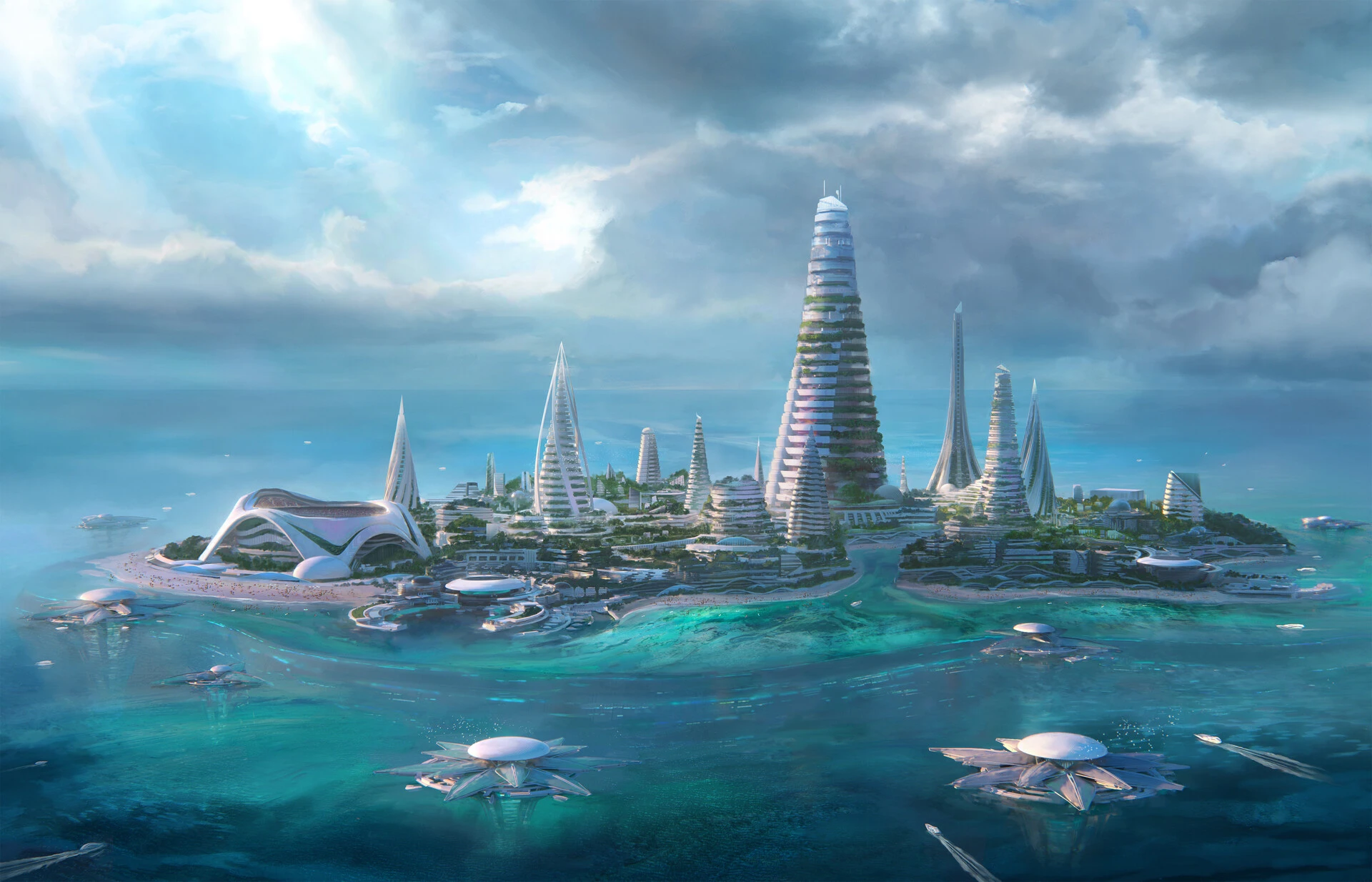
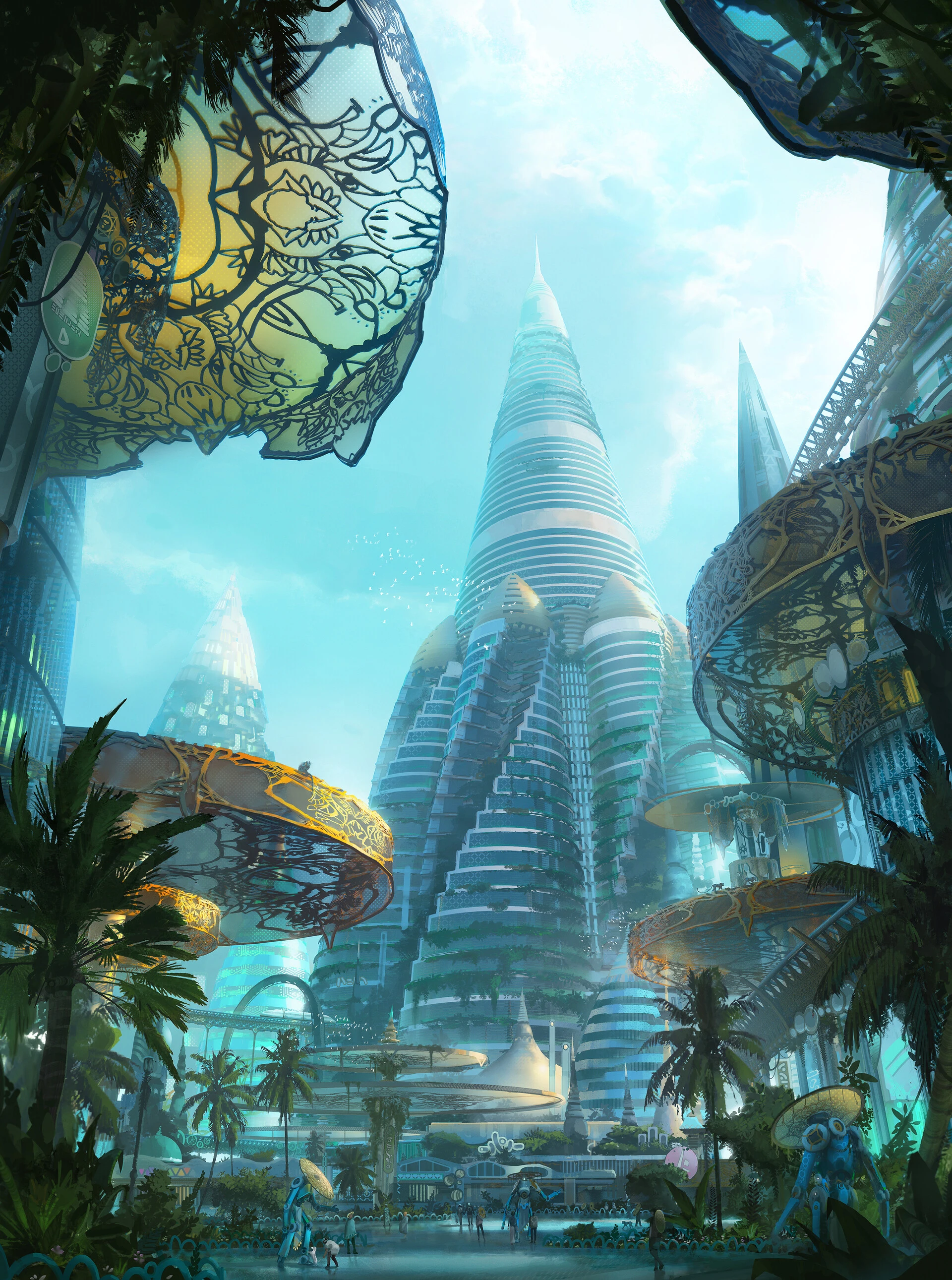
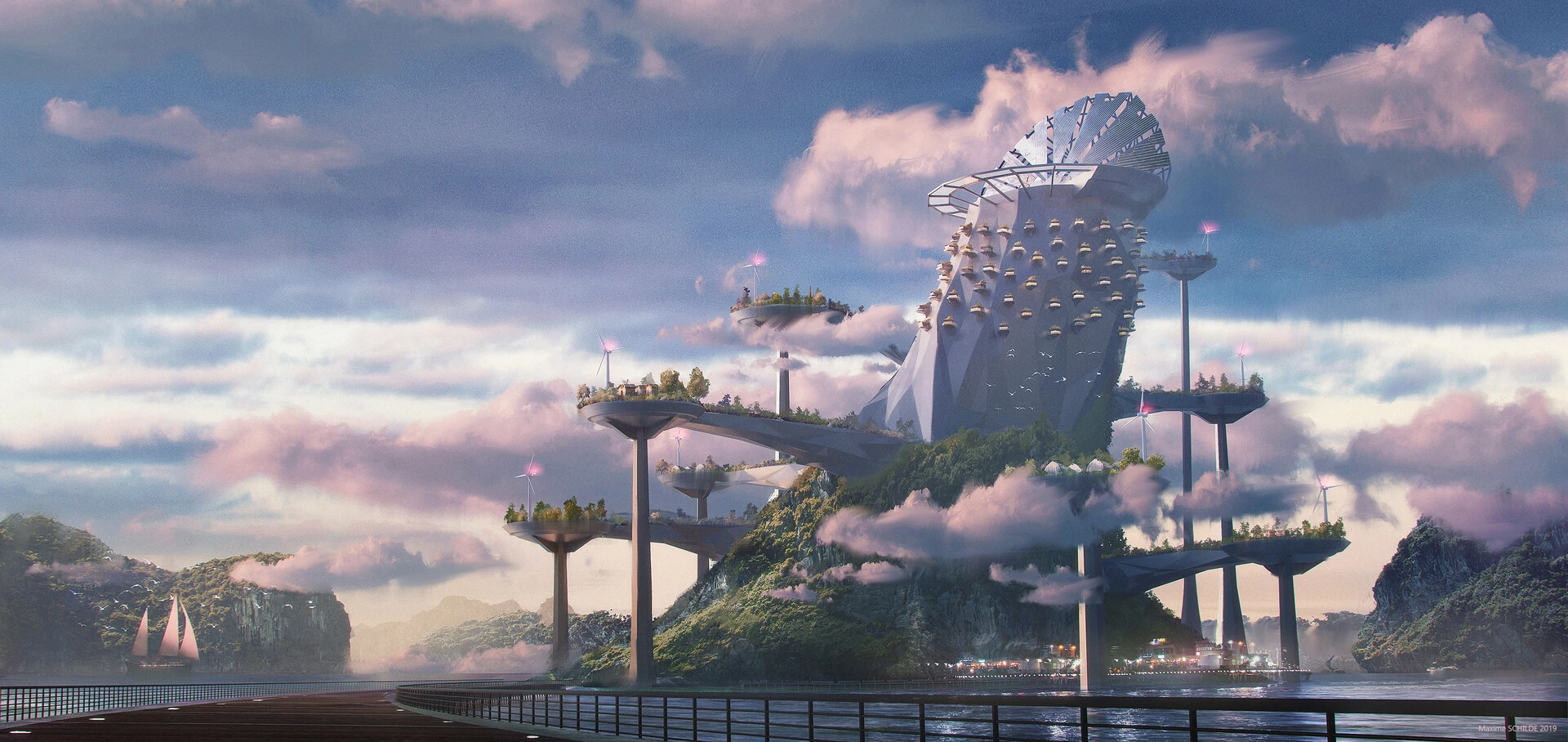
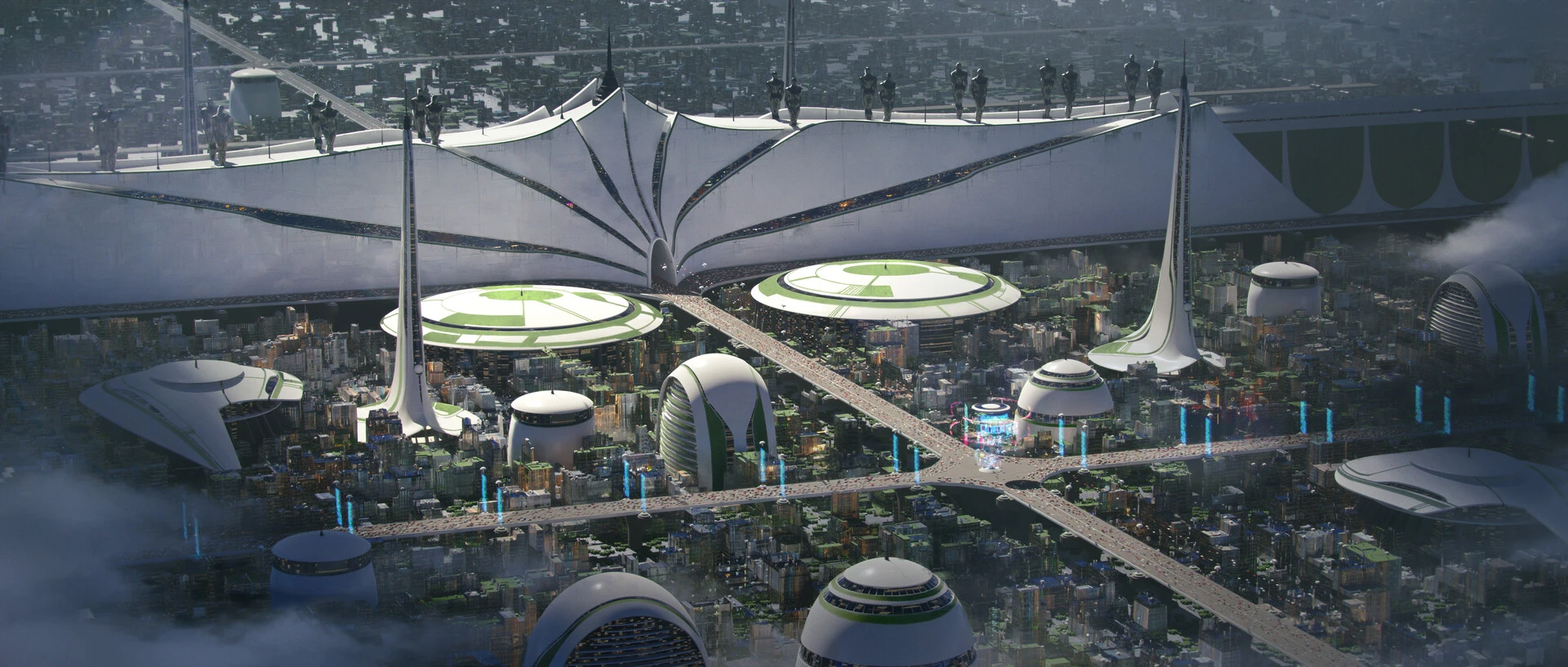

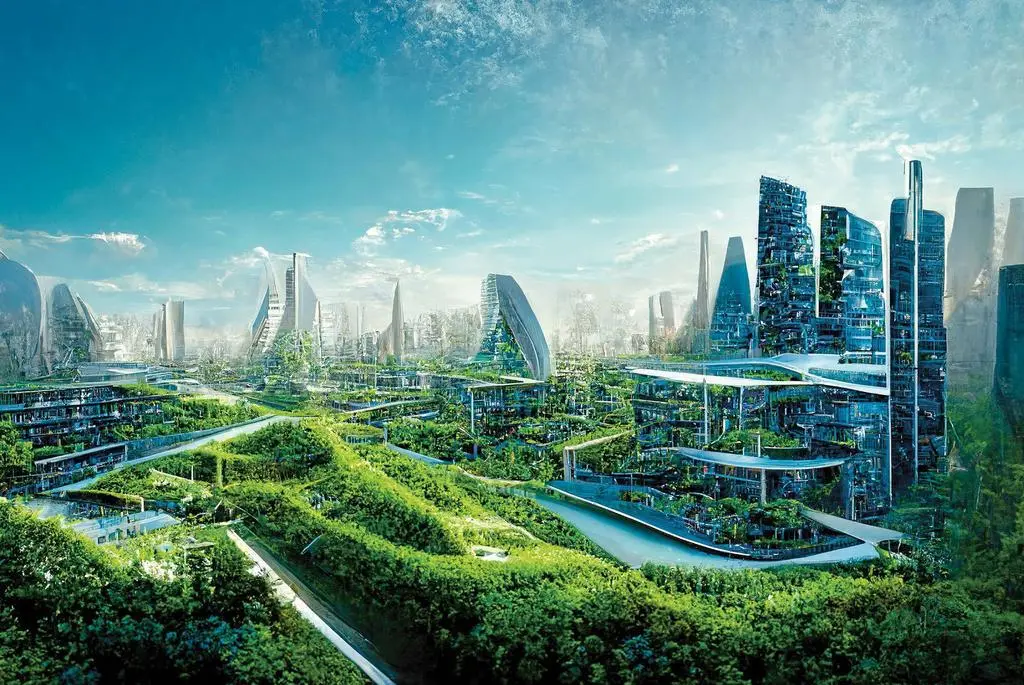
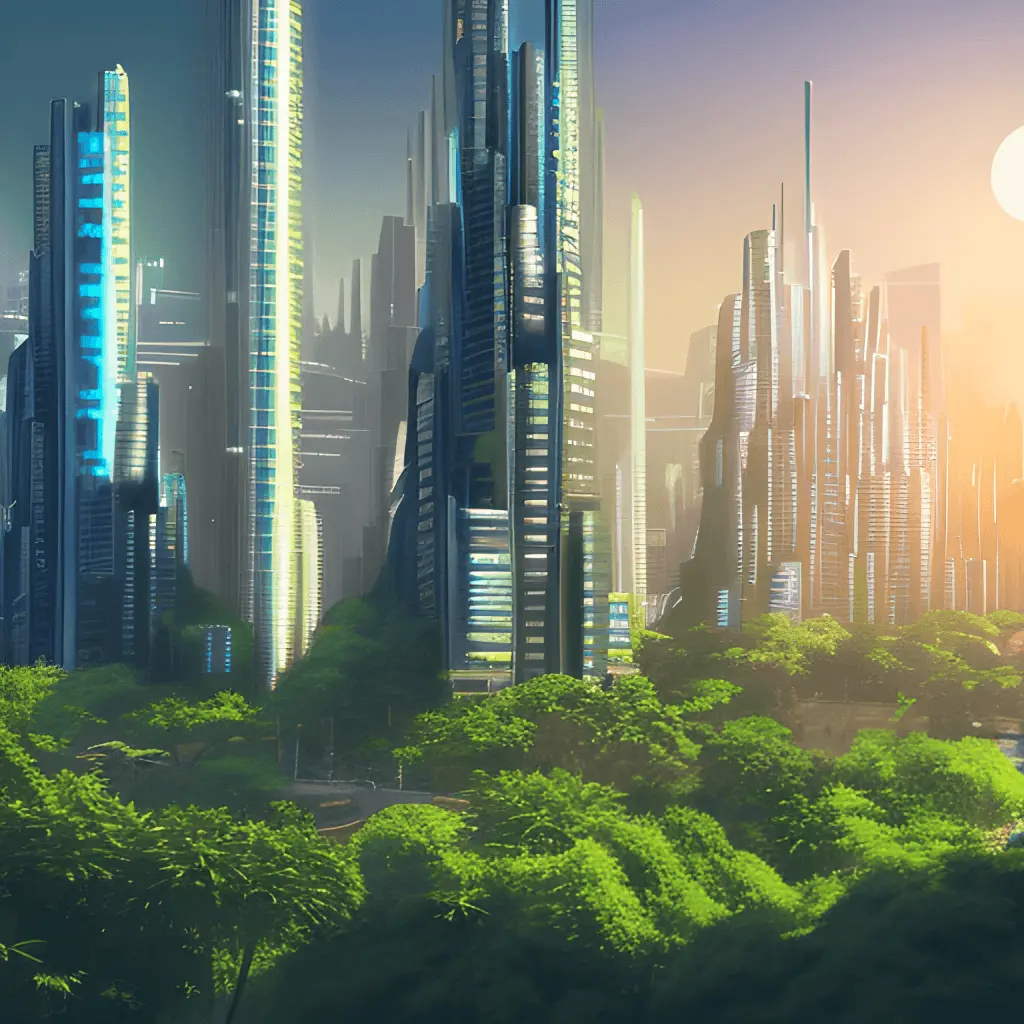
As for utopia, I think it depends on what solarpunk stuff you consume. I’ve read a lot more short stories than I have other solarpunk media, and I’d say that at least at Rekoning Press and Little Blue Marble it’s much more concerned with what society looks like during and after climate disasters, and trying to find hope and options, ways through bad times. I wouldn’t say that I’m trying to depict something utopian, so much as looking for examples of other ways we could do things to mitigate the damage, or different, better ways to rebuild. Hope for the future when things look bad.
I think for visual art, the most common scenes and probably what people think of if they think ‘solarpunk’ probably looks like above, but I don’t know that for sure. That’s kind of why I want to make these.
Where is the existing building mass in those pictures? It’s all weird glass pods. I don’t want to live in a glass pod. Did we just blow up all the old brick warehouses, Victorians, old farmhouses that got engulfed by the city, etc etc?
I want to see my little old house from the 1930s that’s been energy retrofitted, with solar panels and a solar water heater and barrels under the gutters, with apple trees and chickens in the backyard and some bicycles in front.
Exactly - these aren’t obtainable, there’s no roadmap to turn existing cities into this and most people living in them probably wouldn’t want to anyways. They don’t show the character and history and patcheork-ness that makes cities beautiful, they look more like corporate resorts. They’re very nice to look at but they don’t inspire me to change anything because it’s too far a jump from what we have.
I’ll add mixed residential spaces, and retrofitted houses, to the list!
I want to see disabled people, and also generally a world that’s more accessible.
Way too often, disabled people are treated like acceptable casualties, by the left and the right alike. I split with my local climate activist group because the things they were pushing the local council to implement weren’t considering the needs of disabled people at all, and when I raised this as something we should consider, they outright said that they couldn’t let people like me be an obstruction for progress.
I want to see a Solarpunk world because I believe that meaningful systemic change will only happen when we see disabled people and other marginalized communities as a source of wisdom, a sort of “stress-testing” that is necessary for making sure we’re building truly inclusive societies.
I don’t have the brain for any more specific suggestions right now though
That’s definitely something I’m trying to build these scenes to include, especially as I work on cityscapes.
After having a similar conversation on a picture of a cabin I reposted to /c/art, I modified this scene of mine https://slrpnk.net/post/1708554 to make the second rickshaw with the water tank electric, and made sure it’s the kind that uses motorcycle-style controls so someone could operate it without the use of their legs. The hope being to convey that the operator isn’t excluded from this project. As I start working on pictures of places where people actually live, I very much want to get this right.
There’s a lot I don’t know (during that conversation I realized I don’t think I’ve ever been inside a house that would qualify as handicapped accessible) but I’m happy to listen. If you ever have any ideas/scenes you’d like to see realized, feel free to reach out, but it’ll be something I work at either way.
Have the city architecture look different. An efficient building in a hot desert isn’t going to look the same as one in a temperate rain forest.
Nodes of density within the wilderness. Have a set of constrained city boundaries against nature or farmland. Make the dropoff between civilization and managed wilderness a lot steeper.
Physically smaller neighborhood streets for some neighborhoods. They might be only wide enough for two cars, but no one drives on them except for deliveries.
Street based garbage collection instead of building based. You might have a place with bins and compactors that collect an entire street’s worth of trash at one location.
Public roads not just geared for cars. More bike and pedestrian paths. Maybe bus or streetcars can intermingle, but cars don’t.
use of different types of solar where appropriate, we always see PV but solar thermal and bio-solar have some great uses - tanks of algae can be really good for various uses; nutrition for people and animals food and medicine ingredients such as carrageenan and agar, building materials from cellulose, biofules, bioplastic, wastewater treatment, fertilizer as well as potential future uses like being used in biodegradable electronics, as sensor materials (https://www.intechopen.com/chapters/50395) and for more advanced chemistry such as genetically engineered algae making cleaning solutions (great for cleaning solar panels), fuel for cutting tools, and of course alcohol and drug molecules (both medicinal and recreational)
Cody’s Lab has some fascinating videos about his diy algae project, https://www.youtube.com/watch?v=64cEmjtwRgw might be useful as a visual reference, but basically they’re tubes or tanks that sit in the sun or partial shade and grow algae.
people having a cookout on something like this https://en.wikipedia.org/wiki/Solar_cooker or using a larger one to do things like fire ceramics (to maintain and regulate temperature over the duration you’d probably want something like molten salt feeding into a refractory chamber, by controlling the flow rate and mirror focus you could get very good temperature balance) there was a great video with a guy i think in the Nevada desert who had an array which he was using to melt metal and sand casting, this would be a great way to recycle heavy infrastructure from todays society - maybe a scrapyard with mirror arrays used to recycle old cars into useful new tools, the mirrors don’t need to be perfectly reflective so could simply be sheets of metal made from the scrap and polished with a windmill powered grinding plate – the only difficult thing is getting them all to line up, this could be complex tracking gears, digital sensor and motor based systems or a slightly cleverer solution using passive solar tracking where a windowed section of the mirror surface is linked to hydrolytic containers and thermal expansion causes it to realign when one side goes dark - i’ve seen diy people make them that work pretty well but they’re still far from perfect even the expensive industrial ones
Thank you! This is great information and I think I’ve got a couple ideas for where to use it! I really appreciate the details and visual references.
I love the DIY and recycled design of the algae farm you gave as an example, I think I can definitely add that and similar designs to scenes. I’ve also been gathering ideas for a scene of a dense little village for a more rural scene, and I think a larger setup could look good there. Same for in a scene of a homestead, combined with the solar cooker cookout.
I also really like the giant solar cooker junkyard idea. I have a bit of an idea in mind for a zoomed out scene with a junkyard surrounding the giant bright reflectors, and maybe a salvage crew towing a car in through the gates. I’ll see if I can work the mirror polishing windmill into a workshop scene if I do one, or perhaps onsite at the junkyard.
oh nice that sounds really cool, i’m looking forward to seeing what you come up with!
More colorful buildings, emphasizing buildings as a canvas for art from graffiti to commissioned murals
That! :D I feel like in a solar punk utopia people would love to express themselves in more ways than our current society allows. I also believe that the tag/throwup style of graffiti would be way less common in a place where every wall is a canvas.
Agreed about the tagging - if doesn’t have to be covert, if there isn’t the same kind of urgency, people might be able to do more elaborate designs and experiment more. I’ve read people talking about the thrill and secret identity feel of tagging, and I feel like that might be kind of diminished here. Like in the streets I’ve seen IRL that are set aside for graffiti, I don’t see as many marker tags, though some folks online and some of the local taggers seem to only hit government property or advertisements, so they might be reluctant to cover another artist’s work? In a solarpunk society that style might suffer from a touch of habitat loss.
Either way, I want to show this society isn’t one to strangle itself for appearances or property values. People would dress how they want, decorate their spaces how they want. I think there’s more punk in ‘solarpunk’ than I realized before reading more of the fiction and finding this space, and I’d like to show it in these scenes.
Of course it does mean making bonus art to cover walls within the art I’m already making, but if I think of it as environmental storytelling I’ll probably come up with some designs.




